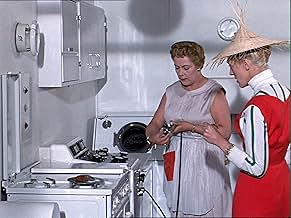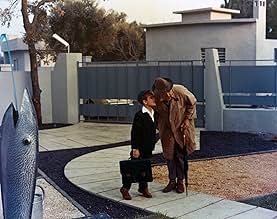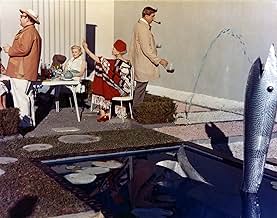CALIFICACIÓN DE IMDb
7.7/10
25 k
TU CALIFICACIÓN
Monsieur Hulot visita el mundo impulsado por la tecnología de su hermana, cuñado y sobrino, pero no puede encajar en ese entorno.Monsieur Hulot visita el mundo impulsado por la tecnología de su hermana, cuñado y sobrino, pero no puede encajar en ese entorno.Monsieur Hulot visita el mundo impulsado por la tecnología de su hermana, cuñado y sobrino, pero no puede encajar en ese entorno.
- Dirección
- Guionistas
- Elenco
- Ganó 1 premio Óscar
- 7 premios ganados y 4 nominaciones en total
Jacques Tati
- Monsieur Hulot
- (sin créditos)
Lucien Frégis
- Monsieur Pichard
- (as Lucien Fregis)
Jean-François Martial
- Monsieur Walter
- (as J.F. Martial)
Alain Bécourt
- Gérard Arpel
- (as Alain Becourt)
Régis Fontenay
- Braces Dealer
- (as Regis Fontenay)
Daki
- Daki, the Arpels' Dachshund
- (sin créditos)
Dominique Derly
- La secrétaire de Monsieur Arpel
- (sin créditos)
- …
André Dino
- Le balayeur municipal
- (sin créditos)
- …
- Dirección
- Guionistas
- Todo el elenco y el equipo
- Producción, taquilla y más en IMDbPro
Opiniones destacadas
Jacques was making a movie to WATCH for future generations to see how the simple social life in the small country towns were going to be killed off with modernism and technology. In his world, safety, community, young/old mixed socialized, street sweepers socialized with Gov't officials... modernism: Isolating, cold, ignorant. Material goods cannot replace a good doughnut and horseplay outdoors. A Vingnette of how the world was changing at that time to where we are today. The music plays in the small quaint town. Where happiness and familiarity go hand in hand. As we see he can survive in that world fine. Modernism is replacing and displacing kind hearted men like my Uncle. A simple loving man who loves the countryside and can no longer assimilate into the new modernism. The movie is done with love and slow funny visuals. It is to be absorbed, and watched as if YOU are the Voyer one summer with My Uncle. The storyline a Social Commentary of post modernism.
I only recently discovered the work of Jacques Tati. As a fan of the great movie comedians-auteurs (Chaplin, Keaton, Brooks, Allen), I wanted to see Tati's work. So far, I have only seen PLAYTIME, MR. HULOT'S HOLIDAY and finally, just recently, MON ONCLE. I can easily say MON ONCLE is not only the greatest comedy of Tati, but also one of the finest comedies ever made. It is truly hilarious. I found MR. HULOT'S HOLIDAY to be just a bit slow at times, where I might find myself losing interest for a moment. PLAYTIME was a bit too "mainstream" with many big special effects and so on. But MON ONCLE is simple yet hilarious. For 117 minutes, Tati keeps the viewer in his own world of comedy. The ultra-modern house gadgets were hilarious, making for some very funny sight gags. Tati's Mr. Hulot character belongs in a gallery of great comic film personas, along with Chaplin's Little Tramp, Keaton's Great Stone Face, Allen's neurotic New Yorker, and Brooks' Jewish characterizations. MON ONCLE is also beautifully photographed in color, which adds a lighter touch to the comedy. I've noticed that Tati's films are unlike those of anyone else. The style is all his own.
Tati's Oscar-winning movie has often been criticized for being the most conventional of his films. I am sure this is true, but on the other hand, there is still enough Tati inside this film to recognize it as one of his. And a touch of storyline and continuity can never be detrimental for a film, not even for a Tati. Actually, this is the most satirical Tati I have seen and therefore, in my opinion, the best. A true masterpiece, unbelievably full of ceative ideas. And I do not understand, how the Academy could award Mon oncle as best foreign film and at the same time completely ignore the tremendous production design.
The word I would use to describe this film is "amusing", not "hilarious"; "amusant" rather than "rigolo". It gently charms a smile onto your face. Only rarely does it bring out an actual guffaw (when M. Hulot is faced with his sister's kitchen, for example). Tati refuses to impose his own ideas of what is important on the viewer, which is usually done by spending more screen time on them or zooming in. The title (usually considered to be important) is a scrawled piece of graffiti which stays on the screen for less than 1/2 second, but there are long sequences showing M. Hulot's apartment. The viewer has to work to see Hulot appearing (apparently randomly) in the various windows of the building as he walks through it. I love the window which is inexplicably at foot level in which you can see Hulot's feet turn to the wall as the feet of a woman dressed only in a slip appear.
In other words, this film is a stroll where, if you keep your eyes open, you will spot some amusing things going on. And France is a great place for a stroll.
Two more things. While the comparison to Chaplin is apt, I was led to think of later characters, particularly Hrundi Bakshi in Blake Edwards' The Party and another almost silent character, Rowan Atkinson's Mr. Bean. Indeed I'm sure Atkinson stole ideas from this film.
Also, I think it is misleading to focus too much attention on M. Hulot's struggles with modern tech. The title, Mon Oncle, should direct our attention to the nephew, for whom Hulot is a parole from the prison of his sterile house, enabling him to run with the kids, get dirty, buy doughnuts from a grubby vendor who applies the icing sugar with a bare hand and play practical jokes on passers-by (with Hulot ready to cover for him if need be). Fifty years later these comments are even more biting as we look at a whole generation of children raised in this kind of inhuman antiseptic environment: overweight, with eating disorders and allergies, socially inept with only a TV and a video game for a friend. Makes a dachshund in a red coat want to run with the mutts and tip over a garbage can or two, doesn't it?
In other words, this film is a stroll where, if you keep your eyes open, you will spot some amusing things going on. And France is a great place for a stroll.
Two more things. While the comparison to Chaplin is apt, I was led to think of later characters, particularly Hrundi Bakshi in Blake Edwards' The Party and another almost silent character, Rowan Atkinson's Mr. Bean. Indeed I'm sure Atkinson stole ideas from this film.
Also, I think it is misleading to focus too much attention on M. Hulot's struggles with modern tech. The title, Mon Oncle, should direct our attention to the nephew, for whom Hulot is a parole from the prison of his sterile house, enabling him to run with the kids, get dirty, buy doughnuts from a grubby vendor who applies the icing sugar with a bare hand and play practical jokes on passers-by (with Hulot ready to cover for him if need be). Fifty years later these comments are even more biting as we look at a whole generation of children raised in this kind of inhuman antiseptic environment: overweight, with eating disorders and allergies, socially inept with only a TV and a video game for a friend. Makes a dachshund in a red coat want to run with the mutts and tip over a garbage can or two, doesn't it?
This was my introduction to the world of Jacques Tati...and I liked it. If Tati's filmmaking M.O. was to remind us of Charlie Chaplin & Buster Keaton, mission very successfully accomplished. 'Mon Oncle' could have been a silent film. It uses sound effects and music to tell 75% of the story anyway, just as Charlie and Buster and their contemporaries did so well in the talk-free era. He also has their simplicity of camera movement. And as with those film giants, Tati is the star/director/producer and co-writer of this project. His recurring Monsieur Hulot character isn't as famous as the Little Tramp, but the quirky Frenchman is just as bumbling and likable.
In line with Chaplin's 'Modern Times', the theme of 'Mon Oncle' is the inability of one man to adapt to new technology. The slapstick sequences that result from the clash of man versus machine are more amusing than truly hilarious. There are a few big laughs, but you'll smile more than than you'll guffaw. There's no standard plot. Hulot's sister, her husband, and their son live in an ultra-modern '50s house. (This weird set is truly magnificent.) Occasionally, they have trendy guests---the out-of-place Hulot among them---and he inadvertently gets the ball of chaos rolling. If his sister's house is too bizarre for him, he still gets to enjoy old-fashioned pleasures in other areas of France. He doesn't fit in with these social climbers, but the man is charming and unflappable in his own eccentric way.
This movie looks as stunning as Hitchcock's 'Vertigo' (also released in '58). Both pictures use colour extraordinarily well (especially green) and Tati's film would be worth seeing for the visuals alone. He also makes it a delightful aural experience with a jaunty music score and comical sound design. It's not all a cold technical exercise, though. The acting is a bit exaggerated (except for Tati's underplaying), but they only look foolish in the name of laughs. Will you enjoy a French comedy from nearly 50 years ago? Is 'Mon Oncle' just a critical darling (Oscar for Foreign Language Film, a prize at Cannes) and not an audience picture? Hey, I didn't think I'd be entertained by a two-hour French trifle, but I was. Rent the Criterion DVD and drink in the plush visuals, then have some grins. Come for the pretty, stay for the witty.
In line with Chaplin's 'Modern Times', the theme of 'Mon Oncle' is the inability of one man to adapt to new technology. The slapstick sequences that result from the clash of man versus machine are more amusing than truly hilarious. There are a few big laughs, but you'll smile more than than you'll guffaw. There's no standard plot. Hulot's sister, her husband, and their son live in an ultra-modern '50s house. (This weird set is truly magnificent.) Occasionally, they have trendy guests---the out-of-place Hulot among them---and he inadvertently gets the ball of chaos rolling. If his sister's house is too bizarre for him, he still gets to enjoy old-fashioned pleasures in other areas of France. He doesn't fit in with these social climbers, but the man is charming and unflappable in his own eccentric way.
This movie looks as stunning as Hitchcock's 'Vertigo' (also released in '58). Both pictures use colour extraordinarily well (especially green) and Tati's film would be worth seeing for the visuals alone. He also makes it a delightful aural experience with a jaunty music score and comical sound design. It's not all a cold technical exercise, though. The acting is a bit exaggerated (except for Tati's underplaying), but they only look foolish in the name of laughs. Will you enjoy a French comedy from nearly 50 years ago? Is 'Mon Oncle' just a critical darling (Oscar for Foreign Language Film, a prize at Cannes) and not an audience picture? Hey, I didn't think I'd be entertained by a two-hour French trifle, but I was. Rent the Criterion DVD and drink in the plush visuals, then have some grins. Come for the pretty, stay for the witty.
¿Sabías que…?
- TriviaJacques Tati borrowed dogs from a local pound for the film and took care of the dogs all through filming. Tati made several shots of them, which he later used to connect scenes. When filming was over, he didn't want to bring the dogs back to the pound, so he placed an advertisement in the newspaper, calling them "movie stars"; all dogs eventually were taken in by respectable families throughout Paris.
- ErroresWhenever M. Arpel parks his car in his tiny home garage, he always pulls in front-end first; however, whenever he leaves for work in the morning, the car always exits the garage front-end first. (This may be a subtle sight gag on (Jacques Tati)'s part.)
- Citas
Charles Arpel: We could go to the Sexy Club.
Madame Arpel: I prefer Constantino and his nice music.
- Créditos curiososThe opening credits appear on signs at a construction site.
- Versiones alternativasAn English version of the movie, that is some 10 minutes shorter with less dialogue, was shot side-by-side with the French version.
- ConexionesFeatured in Omnibus: Monsieur Hulot's Work (1976)
Selecciones populares
Inicia sesión para calificar y agrega a la lista de videos para obtener recomendaciones personalizadas
- How long is My Uncle?Con tecnología de Alexa
Detalles
- Fecha de lanzamiento
- Países de origen
- Idioma
- También se conoce como
- Mon Oncle
- Locaciones de filmación
- Place d'Armes, Saint-Maur-des-Fossés, Val-de-Marne, Francia(street scenes)
- Productoras
- Ver más créditos de la compañía en IMDbPro
Taquilla
- Presupuesto
- FRF 250,000 (estimado)
- Total a nivel mundial
- USD 87,444
- Tiempo de ejecución1 hora 56 minutos
- Mezcla de sonido
- Relación de aspecto
- 1.37 : 1
Contribuir a esta página
Sugiere una edición o agrega el contenido que falta

Principales brechas de datos
By what name was Mi tío (1958) officially released in India in English?
Responda
![Ver Bande-Annonce [VO]](https://m.media-amazon.com/images/M/MV5BZmEzNzA5M2ItZTRhMi00YThkLThlMTItY2M2NThiYTI4NTc3XkEyXkFqcGdeQXRyYW5zY29kZS13b3JrZmxvdw@@._V1_QL75_UY281_CR6)
















